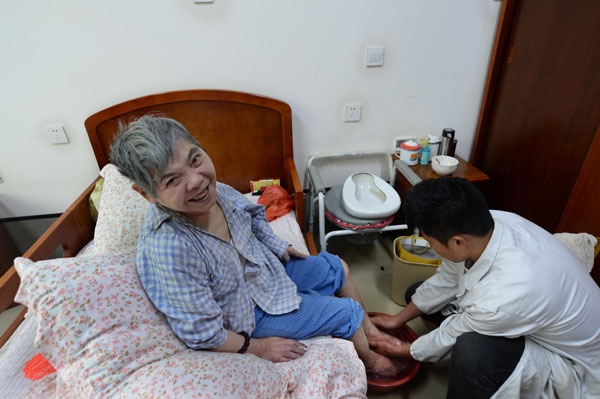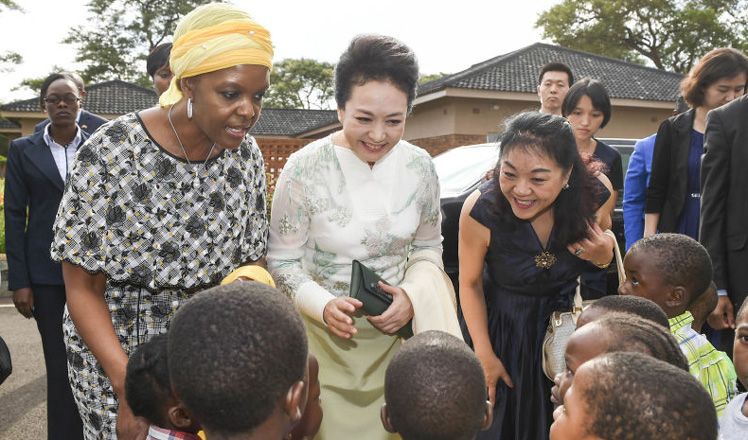Lonely elderly vulnerable
Updated: 2015-11-20 07:50
(China Daily)
|
|||||||||
|
 |
|
A man from a social welfare center for the aged in Guiyang, Guizhou province, washes the feet of 87-year-old Cai Sifen. China is in great need of nursing home beds and professional caretakers for the elderly. [Photo by Qiao Qiming/For China Daily] |
The deaths of an elderly couple in Shanghai, who took their own lives, have once again highlighted the problems faced by many elderly residents in the country.
The couple, both aged 85, opened the gas and set fire to flammable substances inside their house. They were burned to death before firefighters could put out the fire and rescue them. The couple, who each had children from a previous marriage, married in their 50s. They posted a note on the door of their home a few days before they committed suicide, expressing thanks to their neighbors and saying "it's time to go".
Had their children, neighbors and community staff paid more attention to the elderly couple, their deaths might have been prevented.
The tragedy, just one of a series of suicides by senior citizens across the country in recent years, reveals the lack of enough material and psychological support for the elderly, at a time when society is rapidly ageing and changing.
By the end of 2014, the number of people over the age of 60 had reached 212 million in China, accounting for 15.5 percent of the total population. And the grey population is expected to rise to 400 million by the middle of this century.
It is common, especially in rural areas, for elderly people to feel lonely after their children leave to work elsewhere. And an increasing number of seniors suffer from psychological problems to different degrees, according to surveys. The elderly, those in rural areas in particular, are becoming the group at the highest risk of committing suicide.
The psychological problems that plague the aged show that more needs to be done to provide them with support now that social changes mean families often no longer provide it.
- Locals have tradition of drying foods during harvest season
- Beijing-Tianjin-Hebei govts to cooperate on emissions control
- Web promotion of prostitution to be targeted
- Two more spells of smog predicted to sweep North China
- Glass bridge in grand canyon of Zhangjiajie under construction
- Road rage cases pose huge safety challenge

 Can Chinese ‘white lightning’ make it in US?
Can Chinese ‘white lightning’ make it in US?
 Gunmen go on a killing spree in Southern California
Gunmen go on a killing spree in Southern California
 Chinese, South African presidents hold talks to cement partnership
Chinese, South African presidents hold talks to cement partnership
 China, Zimbabwe agree to boost cooperation
China, Zimbabwe agree to boost cooperation
 First lady visits Africa's 'new window' on China
First lady visits Africa's 'new window' on China
 BRICS media leaders to secure louder global voice
BRICS media leaders to secure louder global voice
 Western science in the eyes of Chinese emperors
Western science in the eyes of Chinese emperors
 Top 10 smartphone vendors with highest shipments in Q3 2015
Top 10 smartphone vendors with highest shipments in Q3 2015
Most Viewed
Editor's Picks

|

|

|

|

|

|
Today's Top News
Shooting rampage at US social services agency leaves 14 dead
Chinese bargain hunters are changing the retail game
Chinese president arrives in Turkey for G20 summit
Islamic State claims responsibility for Paris attacks
Obama, Netanyahu at White House seek to mend US-Israel ties
China, not Canada, is top US trade partner
Tu first Chinese to win Nobel Prize in Medicine
Huntsman says Sino-US relationship needs common goals
US Weekly

|

|








